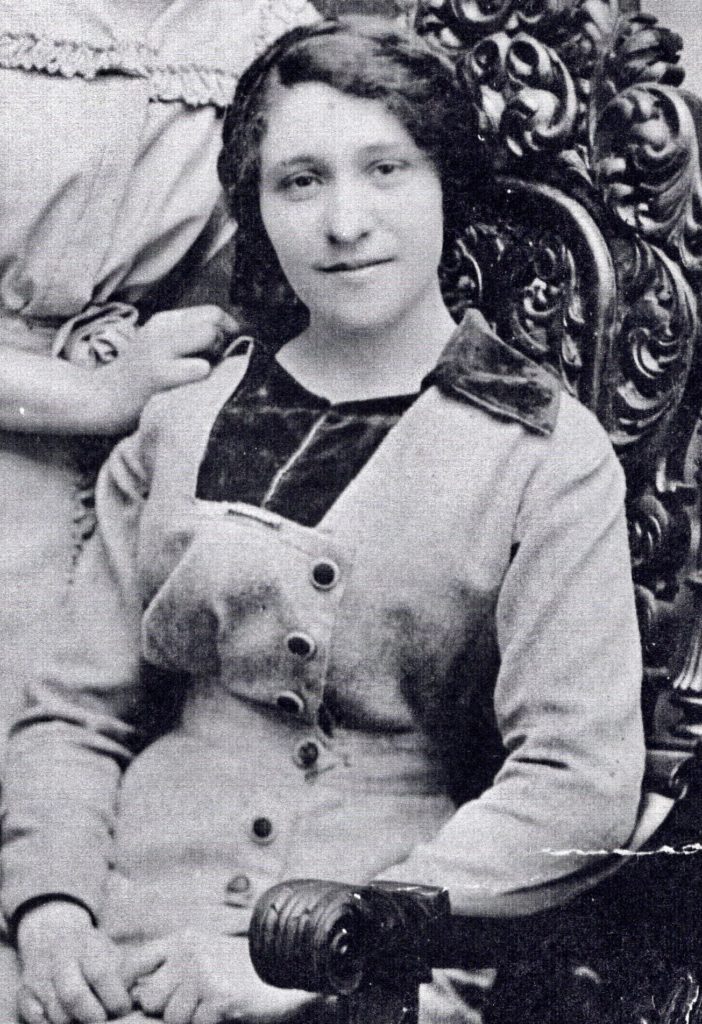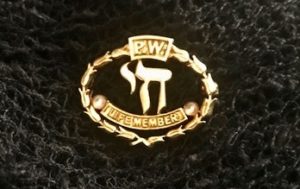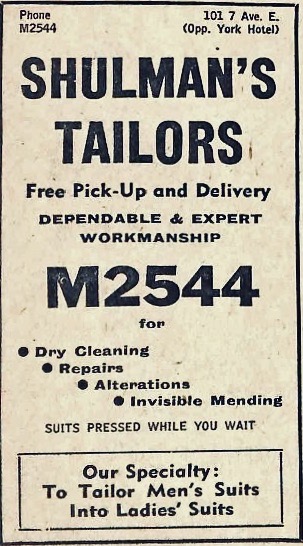The following is an extended version of Paul Finkleman’s Discovery article, published in March 2022. It includes additional anecdotes about Tillie’s driving, among other fond recollections. JHSSA has not edited this version of the article.
How can someone who was driven to help others and became such a positive driving force in the Calgary Jewish Community, also hold the title of Calgary’s worst driver? Well…

Our Grandma, Tillie Shulman, was the fifth child born to Shimon and Passie Block in 1893 in Kherson, a town near Odessa in the Ukraine. The Block family had eight kids when they arrived in Calgary 1908. Tillie met her husband, Simon Shulman while visiting Chicago, married him, and they moved back to Calgary in 1913.
Simon was a Tailor and worked at ‘Twenty-Five Cent Tailors’, 113 8th Ave S.W. They raised a family of three girls, Emily (Finkleman), Jean (Libin) and Nettie (Sarvas). A strong-willed character with a love of people and a high regard for the local Jewish community, Grandma achieved much in her lifetime, particularly as someone who championed women and their families.

Decades before she became Prime Minister of Israel, Golda Meir toured North America as an Emissary speaking to numerous Women’s Councils. During her stop in Calgary in 1928, she met up with Tillie, and inspired her to start the Calgary chapter of Pioneer Women, an organization dedicated to helping women, children and families in need. (It was re-named Na’amat in 1981.) Shortly after that, Golda Meir personally gifted her with a special brooch (see photo), naming Grandma a ‘Lifetime Member’ of Pioneer Women.
Tillie was also the founder of the Mooter Farein of the I.L. Peretz Shul (Calgary’s first Jewish day school, organized by members of the I.L. Peretz Institute) which, although it translates to ‘Mother’s Club’, was much more than just a Parent Council aimed at fostering excellence in Yiddish education. Mooter Farein was very much a cultural force in Calgary, putting on and presenting plays, concerts and lectures, particularly in the 1930’s, 40’s and 50’s at places like the House of Israel and at even grander venues like the Palace Theatre. The Mooter Farein also started up the Calgary Jewish Community Telephone Directory. All this volunteer work involved hundreds of phone calls and countless meetings with groups and individuals, and that’s how she earned her nickname Tillie the Toiler.
Always a strong advocate for women, she caused quite a stir in the community in the 1930’s when she started wearing pants. No women back then wore slacks. But Calgary winters were cold, and during the 1920’s and 30’s, when women’s hemlines were rising to just below the knees, Tillie decided she’d had enough with cold legs. Since she and Simon both had admirable tailoring skills, she created her own pants.
However, the idea of ladies wearing slacks was still considered taboo. A neighbour of hers, Harry Carnat, didn’t like what he saw, and one day accosted my grandfather on the street, telling my Zaida, “You tell your wife it’s un-ladylike to wear pants. She should stop wearing them!” My Zaida’s simple response: “YOU try telling her!”
Eventually, Shulman’s Tailors on 7th avenue became their business, and you can see from the Yellow Pages ad (c.1949), one of their specialties was: “To Tailor Men’s Suits Into Ladies’ Suits,” undoubtedly Tillie’s brainchild.

By the late 1940’s she was widowed, but with a number of grandkids nearby – and lots more on the way – she somehow managed to obtain and keep her driver’s license. I say ‘somehow’ because everyone who knew her agreed that although she may have been a superb citizen, she was a terrible driver.
Gifted with a fine sense of humour and always resourceful, she once parked in an alley downtown, in a loading/unloading zone, just behind her bank on 8th avenue. When she returned from the bank, a policeman greeted her, ready to write a ticket. She asked why, and he pointed to the large ‘Loading/Unloading Zone’ sign. She replied, “But officer, I was in the bank unloading my money.” With a look that said “Touché!” he simply put away his ticket book.
In the 1960’s she had begun to suffer from hearing loss, but still kept socially active, driving herself and friends all over town to play Canasta or Kalookie. Having a car allowed her to take her grandchildren for picnic outings, treat them to dinner, or enjoy a Drive-In movie.
One time, there were three of us grandkids in the back seat of her massive old 1954 Buick tootling down 6th avenue, which had just become a one-way street. She was heading past the old Number One Firehall, (going her usual painfully slow pace and straddling two lanes) when two fire trucks pulled out behind us. They were soon on our tail, sirens wailing and honking their incredibly loud horns. Knowing that our hard-of-hearing grandmother was oblivious to what was going on behind her vehicle, we started screaming at her to pull over. Our frantic yelling, coupled with the noise of the honking and sirens just a few yards behind us, caused Grandma to yell, “If you boys don’t quit making all that noise, I’m going to pull over.” Oh, the irony of that statement! The look the firemen gave her as they accelerated past us was unforgettable, as we struggled to explain to them with gestured hands that we were sorry and that our grandmother was going deaf, and NOT a very good driver.
Around 1970, I took Grandma, now 77, to get her Driver’s License renewed. Her hearing was going, her legs were slowly giving out, but she’d be damned if she was going to give up driving her car. Had it been an actual driver’s examination where she got behind the wheel and was tested for her driving skills, there’s no doubt she would have failed, and the examiner would have been plagued by nightmares for years to come. But fortunately for her, it was simply a written multiple-choice exam. I witnessed the whole thing because it was a relatively small office. There were 20 questions, and I watched as she checked off the answers. When the poor fellow giving her the test showed her the results (Grandma got 5 out of 20 correct) she immediately put on a thick accent pleading that she could barely read English, and asked to be guided through the test with his help. Well, you can guess the outcome: She manipulated him into telling her the right answers, and she was able to keep her license. What an actress!
In 1963, Tillie was honoured by the Calgary Jewish Community at a special Mother’s Day luncheon at the Shaarey Tzedec as “Mother of the Year.” But this award wasn’t just because she was a great mother (which she certainly was). It was intended in a more meaningful and significant way, recognizing all her accomplishments as the woman whose heartfelt efforts and enormous energy gave birth – figuratively speaking – to groups like Pioneer Women and the I.L. Peretz Mooter Farein.
Her legacy lives on. When her grandkids get together, stories abound and laughter ensues. But these tales of Tillie are always infused with a deep sense of admiration and respect for this woman who empowered others, and gave so much of herself to creating a healthy, happy and helpful Jewish community in 20th century Calgary.

